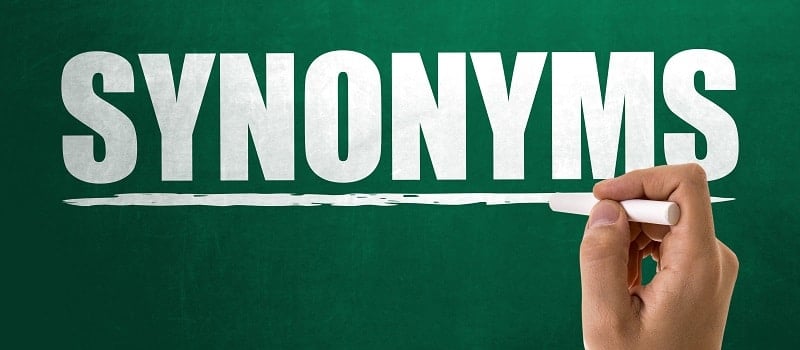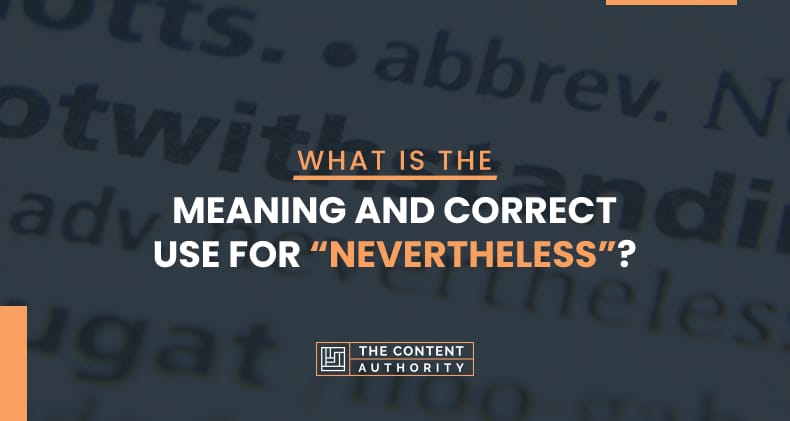“Nevertheless” is one of the most misused words in the English language, this is a result of people not having a detailed understanding of the word. You are ready to learn everything there is to know about this word so you can use it correctly. You are probably thinking, what is the meaning and correct use for “nevertheless.”
The word “nevertheless” plays the role of an adverb in a sentence and it makes the reader know that something occurred though something else might have stopped it from happening. A clear example of the usage of the word is: Felicia never liked reading novels, but she enjoyed that book nevertheless.
Now, we guess you are wondering why a lot of people misuse the word despite how easy it looks. You have nothing to worry about, in this article, we will discuss and clear up all the misconceptions and obscurities you may have about the usage of this word.
What Does The Word “Nevertheless” Mean?
One vital thing you must understand before you can use a word effectively and correctly is the meaning of that word. As long as you do not understand what a particular word means, you will continuously misuse it.
Before we dive into how to use the word “nevertheless,” we will take a look at the origin, the meaning, nature (part of speech), the antonyms, and the synonyms. This is to ensure we lay the basic foundation.
Right now, we will look into the origin of the word “nevertheless.”
The word “nevertheless” originates from the Middle English word “nevertheless,” (variances of the word include “neuerþelesse,” “neverþeles,” “neuerþeles,” and “nevereþelesse”). These words are similar to the word “never.”
We have established the origin of the word “nevertheless,” we will look into the meaning of the word.
The word “nevertheless” is made up of three words joined together, “Never,” “The,” and “Less.” And it means “notwithstanding,” “despite a fact mentioned,” “however,” and “nonetheless.”

The word can also mean “all the same,” “even so,” “despite anything”, “to the contrary” (usually comes after a concession), also meaning “despite what has been referred to” or “just been said.”
You will notice from the several meanings given, the word “nevertheless” is used to show the relationship between a sentence, word, or phrase and what has been said or previously stated.
Next, we will see what the nature of the word is, the role it can play when you use it in a sentence, the form that the word “nevertheless” can take. This usually refers to the part of speech the word is categorized under.
The word “nevertheless” is an adverb. It qualifies or modifies a verb, adjective, or another adverb. It is a conjunctive adverb, meaning it connects two clauses by changing the clause introduced into an adverbial modifier of the verb in the main clause.
And the word can be used at the beginning, middle, or end of a single independent clause which is one of the features of a conjunctive adverb.
Some of the synonyms of the word “nevertheless” are:
- Nonetheless
- However
- Still
- Yet
- Though
- But
- Anyway
- Regardless
- Notwithstanding
- Despite
- In spite of
- All the same
- Withal
- Even so
- Having said that
- Be that as it may
- That said
- Come what may
- Howbeit
- Still and all
- After all
You will observe that not all synonyms are words, some phrases can also be used in place of the word “nevertheless.”

The antonyms of the word are:
- Therefore
- Consequently
- Hence
- Thus
- Accordingly
- As a result of
- For this reason
- Due to this
- Ergo
- In that case
- Subsequently
- Thereupon
- Then
- Due to the fact that
- By doing so
- As a consequence
The same thing you must have observed in the synonyms is also in the antonyms, they can be used as an opposing word to “nevertheless”.
With that been said, we can now properly look into how you can use the word in a sentence.
How to Properly Use “Nevertheless” In A Sentence
We use the word “nevertheless” to contrast the first point with a second point. You are talking about an event that has occurred and the next sentence contrasts the previous one.
You can use the conjunction “But” before using “nevertheless” in a sentence. It is not an established rule but you can use it. Though some people say using “but” and “nevertheless” together is redundant because they perform the same function, others claim it is not redundant because “but” is a conjunction and “nevertheless” is an adverb playing a different role.
The word “nevertheless” can also be used to start a new sentence, so rather than using a comma you can use a full stop and start a new sentence with it. You can also use a semi-colon before using “nevertheless.”
Although the words “however” and “nevertheless” are close synonyms, they cannot be used interchangeably every time. There are situations where you must not replace “however” with “nevertheless” and vice-versa. Some usage guides claim that “nevertheless” cannot be replaced with “however.”
Another thing you need to know is the word “nevertheless” is used more frequently in the active voice (when the subject acts) rather than passive voice, “nonetheless” can be used for passive voice (when the subject is the recipient of the action).
You should only use the word “nevertheless” when referring to a situation or an event which “has,” “is” or “may occur.” The event must have either occurred, it is in occurrence or it may likely occur.
Following these simple procedures will guarantee you a correct usage of the word “nevertheless.”
Illustrative Examples on how to use the word “Nevertheless”
For better clarity of all the explanations we have given, we will look at some examples of how the word “nevertheless” can be used in a sentence.
Incorrect
- It is great to know you have good notices; nevertheless even if you do not read them.
- Without a doubt, the middle class seems to be indecisive, but we need to leverage its positive side and unite with them, nevertheless.
- Nevertheless, a lot of marriages fail after between five and ten years, people still plan on getting married.
- Under such conditions of the soil, the land. Nevertheless, produces plants of wheat and other grains.
- David’s sister was recommended for the job position, the boss’s distant cousin received the position; nevertheless.
- Ham has a bad record of misbehaving and he has missed football practice, nevertheless he is an outstanding player.
- There is little chance we will succeed in changing the laws, it is vital we give it a shot nevertheless.
- Nevertheless, having managed somehow to skip going to college, John has made a fortune as a very young man.
- It is the set of attitudes displayed that eventuated in the development of modern capitalism, nevertheless.

Correct
- Nevertheless, it is great to know you have good notices, even if you do not read them.
- Without a doubt, the middle class seems to be indecisive, but we need to, nevertheless, leverage its positive side and unite with them.
- A lot of marriages fail after between five and ten years; nevertheless, people still plan on getting married.
- Under such conditions of the soil, the land, nevertheless, produces plants of wheat and other grains.
- David’s sister was recommended for the job position, the boss’s distant cousin received the position nevertheless.
- Ham has a bad record of misbehaving and has missed football practice, but he is an outstanding player nevertheless.
- There is little chance we will succeed in changing the laws. Nevertheless, it is vital we give it a shot.
- Having managed somehow to skip going to college, John has nevertheless made a fortune as a very young man.
- It is nevertheless the set of attitudes displayed that eventuated in the development of modern capitalism.
Here are some vital things to take note of from the examples.
- In example 1, the word “nevertheless” is used in the middle of the sentence making it difficult to understand. It is supposed to be at the beginning in that context.
- In examples 2, 7, and 9, the word “nevertheless” is used at the end of the sentence. It is meant to be used in the middle of the sentence.
- In examples 3 and 8, the word “nevertheless” is used at the beginning of the sentence. The accurate place is the middle of the sentence.
- In example 6, the word “nevertheless” is used in the middle of the sentence, it is supposed to be at the end of the sentence.
- In examples 4 and 5, the punctuation mark used before the word “nevertheless” is incorrect. A full stop is used instead of a comma in example 5 and a semi-colon is used when there should be no punctuation mark in example 6.
Final Thoughts
You have no reason to struggle with the use of the word “nevertheless.” We have given all the rules guiding the usage in this article. A comprehensive understanding of the word is available for you.
You are now more knowledgeable and use this word with expertise or any of its synonyms to your liking in your next writing.
Shawn Manaher is the founder and CEO of The Content Authority. He’s one part content manager, one part writing ninja organizer, and two parts leader of top content creators. You don’t even want to know what he calls pancakes.

